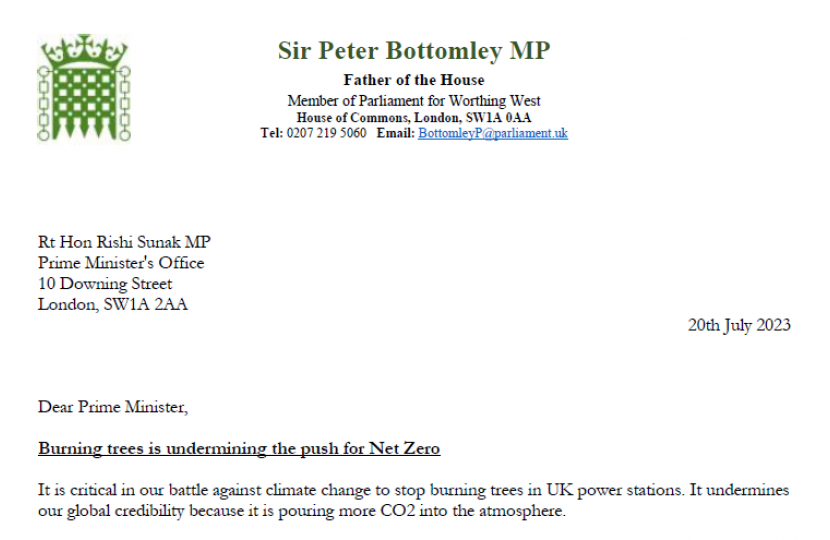
There has been a remarkable erosion of backbench support for the burning of wood in our power stations as a form of renewable energy.
Over the last two years over 100 backbench MPs have through, signing letters or the application for last December’s debate, indicated that they have severe reservations.
Over recent weeks the arguments against this practice have grown stronger.
Ofgem has now launched a formal investigation into Drax over its claims for renewable subsidies.
We have also had the revelation that Drax’s internal advisers - led by the former Government chief scientific officer Professor Sir John Beddington - will no longer permit the company to call its burning of wood “carbon neutral”.
As the Government finalises its biomass strategy, I led on writing a cross-party letter to the Prime Minister urging for a reconsideration of subsidies for Biomass energy with 60 MPs from across the House signing in support.
It is critical in our battle against climate change to stop burning trees in UK power stations. It undermines our global credibility because it is pouring more CO2 into the atmosphere.
The experiment started in 2004 with 50,000 willow trees all sourced from Yorkshire. Since then, in a classic case of ‘bait-and-switch’ we now burn 27 million trees a year with every single one imported. To give an idea of the scale, the New Forest only contains 46 million trees. The imported trees are being hauled across the Atlantic in polluting ships.
Of still greater concern is that, according to the IPCC, burning trees creates even more CO2 emissions than burning coal.
Yet despite this harm, UK consumers have been forced to pay £6 billion in renewable subsidies.
The experiment must end. We should leave trees in the ground.
There must be no further subsidies for burning trees in our power stations beyond the current 2027 contracts. It is undermining public confidence in the push towards Net Zero.
The Government should reconsider its current position.
The text of the letter is below:
Dear Prime Minister,
Burning trees is undermining the push for Net Zero
It is critical in our battle against climate change to stop burning trees in UK power stations. It undermines our global credibility because it is pouring more CO2 into the atmosphere.
The experiment started in 2004 with 50,000 willow trees all sourced from Yorkshire. Since then, in a classic case of ‘bait-and-switch’ we now burn 27 million trees a year with every single one imported.
To give an idea of the scale, the New Forest only contains 46 million trees. The imported trees are being hauled across the Atlantic in polluting ships.
Of still greater concern is that, according to the IPCC, burning trees creates even more CO2 emissions than burning coal.
Yet despite this harm, UK consumers have been forced to pay £6 billion in renewable subsidies. This money would be better spent on clean energy and planting trees at home - trees which capture carbon as nature designed.
This month, the Sunday Times called the subsidies a “tree-burning racket”. The vested interests are pleading for more. However, there is a deafening range of voices challenging the continuance of any green subsidies.
Latest developments:
Last month, Ofgem announced it was investigating Drax’s sustainability claims. The Guardian said this was amid “growing scepticism over its green credentials”. That came shortly after Sky News revealed that the company had been told by its own advisers to stop claiming that burning trees is “carbon neutral”.
Earlier, 505 scientists had stated that burning forests for electricity was creating a huge carbon debt. Chatham House, Ember and the EU’s top scientific think tank EASAC have also rejected the industry’s assertions.
Additionally, last summer, the then Energy Secretary, Kwasi Kwarteng told MPs that burning imported trees “does not make any sense” and that his department was close to deciding that it “doesn’t help carbon emission reduction and so we should end it.”
Achilles heel:
The insurmountable problem with burning trees is the carbon payback period - the time it takes for new trees to absorb all the carbon lost after the old ones are felled. Chatham House estimates the payback period is close to 104 years. One academic paper said it could be 190 years. Therefore the carbon debt for trees burnt today may not be paid off until 2213.
This is the Achilles heel of the tree burning industry; you should not get Net Zero subsidies if you are making it harder to reach the 2050 target.
The industry’s other claim - that it only burns “waste wood” has been thoroughly debunked. Senior journalists from BBC Panorama, The Telegraph and CBS News have reported how entire forests are being cleared to feed the UK’s demand for burning wood. Even primary forests are destroyed with horrendous implications for biodiversity.
Yet the UK’s current plan is to expand our burning of trees. The Telegraph says it calls for the equivalent of 120 million trees a year to be consumed. The total would be an astonishing 2 billion trees by 2050. If other countries copied us it would force up global prices for timber and food as competition for land intensified. The IPCC fears the result could “push planetary boundaries”.
The experiment must end. We should leave trees in the ground. Or lock the carbon in furniture - or, in the case of willow, cricket bats. There must be no further subsidies for burning trees in our power stations beyond the current 2027 contracts. It is undermining public confidence in the push towards Net Zero.
Your sincerely,
Sir Peter Bottomley MP
Adam Afriyie MP
John Baron MP
Sir Peter Bottomley MP
Atta-Ur-Rehman Chishti MP
Virginia Crosbie MP
Victoria Ford MP
Joanna Gideon MP
Sally-Ann Hart MP
Oliver Heald MP
Pauline Latham MP
Jonathan Lord MP
Craig Mackinlay MP
Cherilyn Mackrory MP
Jason McCartney MP
Angela Richardson MP
Selaine Saxby MP
Andrew Selous MP
Sir Gary Streeter MP
Theresa Villiers MP
Robin Walker MP
Caroline Lucas MP
Jeremy Corbyn MP
Margaret Ferrier MP
Diane Abbott MP
Hilary Benn MP
Paul Blomfield MP
Richard Burgon MP
Geraint Davies MP
Margaret Greenwood MP
Kim Johnson MP
Anthony Lloyd MP
Rebecca Long-Bailey MP
Rachael Maskell MP
Grahame Morris MP
Charlotte Nichols MP
Bellavia Ribeiro-Addy MP
Virendra Sharma MP
Barry Sheerman MP
Nicholas Smith MP
Graham Stringer
Zarah Sultana MP
Michael Whitley MP
Nadia Whittome MP
Mohammad Yasin MP
Wendy Chamberlain MP
Tim Farron MP
Wera Hobhouse MP
Christine Jardine MP
Sarah Olney MP
Munira Wilson MP
Ben Lake MP
Steven Bonnar MP
Alan Brown MP
Angela Crawley MP
Allan Dorans MP
Gavin Newlands MP
Thomas Sheppard MP





